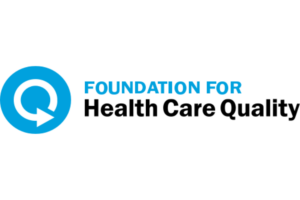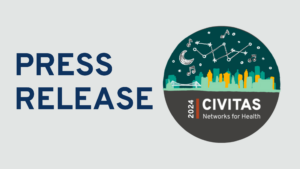New Member Spotlight with Foundation for Health Care Quality
By Kelsey Matheson and Malik Chambers
The national wave pushing for including diverse voices to drive quality of health care and equity is undeniably strong. Among those leading the charge is the Foundation for Healthcare Quality (FHCQ). Eager to delve deeper into their mission and initiatives, our team engaged in an enlightening conversation with Ginny Weir, CEO of FHCQ.
Here’s what we learned.
A Legacy of Unbiased Collaboration Driving Quality of Care Regionally
Since its inception in the late 1980s, FHCQ has emerged as a hallmark of collaboration across the health care spectrum. Rooted in the Pacific Northwest (PNW) but reaching as far as Tulsa, Oklahoma, this nonprofit organization serves as a nexus, bridging sectors that traditionally function in silos. Their mission is clear: catalyze holistic enhancements in health care quality, equity, and outcomes. FHCQ sees health equity as an integral part of quality, there is no quality without equity.
A salient exemplar of their dedication is the inception of the Cardiac, Surgical, Spine, and Obstetrical Care Outcomes Assessment Programs (COAPs). The COAPs are:
• Clinician-led quality collaboratives focused on improving clinical processes.
• Actionable by using chart-abstracted clinical data that is benchmarked against program averages.
• Inclusive of the variety of delivery locations and of clinical health care professionals who provide care.
The FHCQ’s tapestry of foundational ideals and primary focuses lays the groundwork for their multifaceted and encompassing approach to health care.
• Cardiac COAP is fully transparent and anyone within or outside of the PNW can see outcomes and process measures here.
• OB COAP includes data from all birth settings, allowing access to comparisons and quality initiatives.
• The new Community Birth Data Registry was created by midwives for midwives to focus on clinical quality data capture for out of hospital births.
• Smooth Transitions brings together community midwives, hospital providers and staff, and EMS personnel to build a collaborative model of care that puts birthing families at the center.
Strategizing Health Care Enhancements with Equity and Inclusion at its Core
Deep-seated in FHCQ’s DNA is the intent to uplift care outcomes. Their methodical strategy encompasses:
• Innovative Data Review: Automating medical data abstraction to identify best practices, significantly easing financial pressures on members.
• Engaging Collaborative Forums: Partnering with specialized health care communities, underscoring equitable birth outcomes, and enhancing the quality during unplanned hospital transfers.
• Insight-Driven Refinement: Gleaning insights from data, refining practices, and championing iterative feedback loops to catalyze transformation.
The Bree Collaborative initiative stands out as an exemplar. Originating from the state legislature, this consortium devises clinical guidelines that harmonize purchasing, payment, and care delivery. Additionally, the Washington Patient Safety Coalition provides a unified platform for diverse health care stakeholders to achieve shared patient safety aspirations. A new addition to the patient safety initiatives is the Communication and Resolution Program, a process that healthcare organizations can utilize to address and prevent patient harm. Validation can provide health care organizations with valuable feedback regarding their response to an adverse event in real-time and receive support troubleshooting challenges from neutral experts.
Their Care Outcomes Assessment Program (COAP) initiatives and actionable insights have positioned FHCQ as a regional torchbearer, fostering a health care environment receptive to innovative solutions, always centering community well-being.
Pivoting in an Ever-Evolving Health Care Delivery Landscape
Acknowledging the fluidity of health care, FHCQ proactively seeks partnerships to traverse this dynamic terrain. From devising sensible opioid guidelines to championing health equity blueprints, their pledge to excellence remains unwavering. Central to their innovation is community engagement. By incorporating feedback from patient advisory panels and lived experience groups, they offer a panoramic, ground-up approach to health care solutions. They actively engage with patients who have undergone transformative surgeries, gaining invaluable insights into life after profound physical trauma. By integrating these programs and valuing first-hand experiences, FHCQ fosters an empathetic collaboration with physicians, merging data-driven insights with compassionate care approaches.
A Quest for Collective Wisdom
The motivation behind the FHCQ joining the Civitas membership network is clear: to continuously improve by learning from peers and comparing across different markets. Their enthusiasm for networking, learning, and sharing, mirrors their commitment to quality and equity.
“We know that we’re doing good work in our community, but we can always do better,” said Ginny. “Civitas has a vast network for organizations doing like-minded work around the country and serving different patient populations – with our growth goals, learning from industry peers is vital and this network is unlike any other. FHCQ is excited to be a part of it.”
The Road Ahead for FHCQ
With aspirations to influence beyond the PNW boundaries, FHCQ believes their methodologies and insights hold the potential to revolutionize health care nationwide. They are steadfast in their vision: health care experiences that are consistently respectful, stellar in quality, and devoid of biases. In championing health equity and inclusivity, the Foundation for Health Care Quality epitomizes what the intersection of collaboration, innovation, and unwavering community commitment looks like. The horizon seems promising, and we look forward to partnering with them in the year to come.
Learn more by visiting the FHCQ website.




